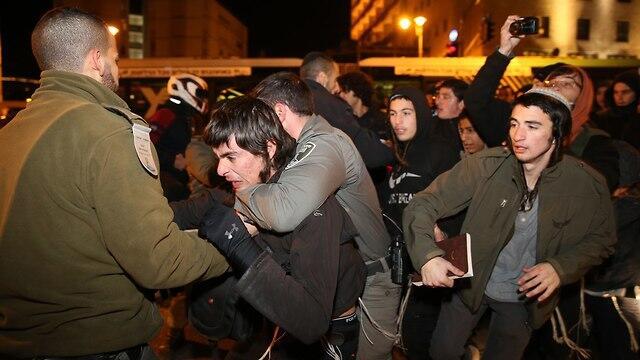Getting your Trinity Audio player ready...
Trust is a rare commodity. We live in an era when trust in the systems around us is gradually eroding—to the point of being gone entirely—and we almost don't believe anyone anymore. There are good things about it too, but when this crisis of trust concerns certain state systems, this situation could claim a painful price. Such is the crisis of trust in the defense establishment.
and Twitter
When the rumors about the murder of a young woman in a forest in Jerusalem were confirmed, a gag order was imposed on the case, which included the clear statement that the motive (of the suspected Palestinian killer) was unknown. And thus the deep rift that has existed for years between some of the residents of Judea and Samaria (West Bank settlements) and the Shin Bet intelligence agency widened into a vast abyss.
The Shin Bet has earned this crisis of trust—with the interrogation of the suspects in the murder in Duma, for example, and with stories about arrests and torture that astounded even the agency's greatest defenders. This is compounded by an expose on how secret Shin Bet informants married women settlers in order to gather intelligence, not to mention the pathetic response issued by the Shin Bet, which utterly failed to understand the kind of storm this expose generated among sections of Israeli society.
1 View gallery


Protest outside the Prime Minister's Residence against the arrest of settler youth suspected of terrorism
(צילום: עמית שאבי)
The arrests and interrogations of the students from the Pri Haaretz yeshiva further deepened the divide and created a sense of persecution, hatred and particularly hostile treatment of an entire sector of the population.
"I no longer believe them about anything," says one neighbor, while another friend adds that she doesn't think there is another demographic in Israel that endures such hostile treatment from the Shin Bet.
"Die quietly," says one of the social media posts that have been making the rounds amongst us since Friday afternoon, illustrating the extent of the crisis: "Shut up. There's a gag order. There's the Shin Bet. There is torture. You're not allowed to speak, you're not allowed to shout. We returned to Israel to form a security service that harms Jews with sidelocks and teenagers, that traumatizes our sons, exploits our daughters and silences their parents."
Another post demands that we "talk about the Shin Bet, which is constantly harassing young teens, who are left to rot in jail for long months. Talk about the fact graffiti on the wall is a terrible crime, and the torture of Jewish teens is a sacrifice to Moloch (a Canaanite god associated with child sacrifice), which the Jewish state makes its masters. But bringing damned murderers to justice? No."
When these cracks in our trust are not handled correctly, there is great confusion—and ultimately everything goes to ruin. When these cracks in our trust are not dealt with, no one notices that the Shin Bet deserves commendation for apprehending a terrorist impressively quickly, something that should remind us all of the agency's primary mission to allow daily life in the State of Israel to go on undisturbed. The Shin Bet personnel do this day and night, making immense sacrifices—and we must never forget that.
But the crisis of trust that has emerged as a result of this neglect is something that undermines Israel's national security, and that affects us all. And so, as we reach this low point, we need to stop for a moment and think about how we move forward—the Shin Bet on the one hand, and the leadership of the residents of Judea and Samaria on the other. This is a joint move, and we need to rebuild that trust. It's not that complicated: we need to understand the danger—and most importantly take responsibility for our actions.
Tamar Asraf is the spokeswoman for the Binyamin Regional Council.

